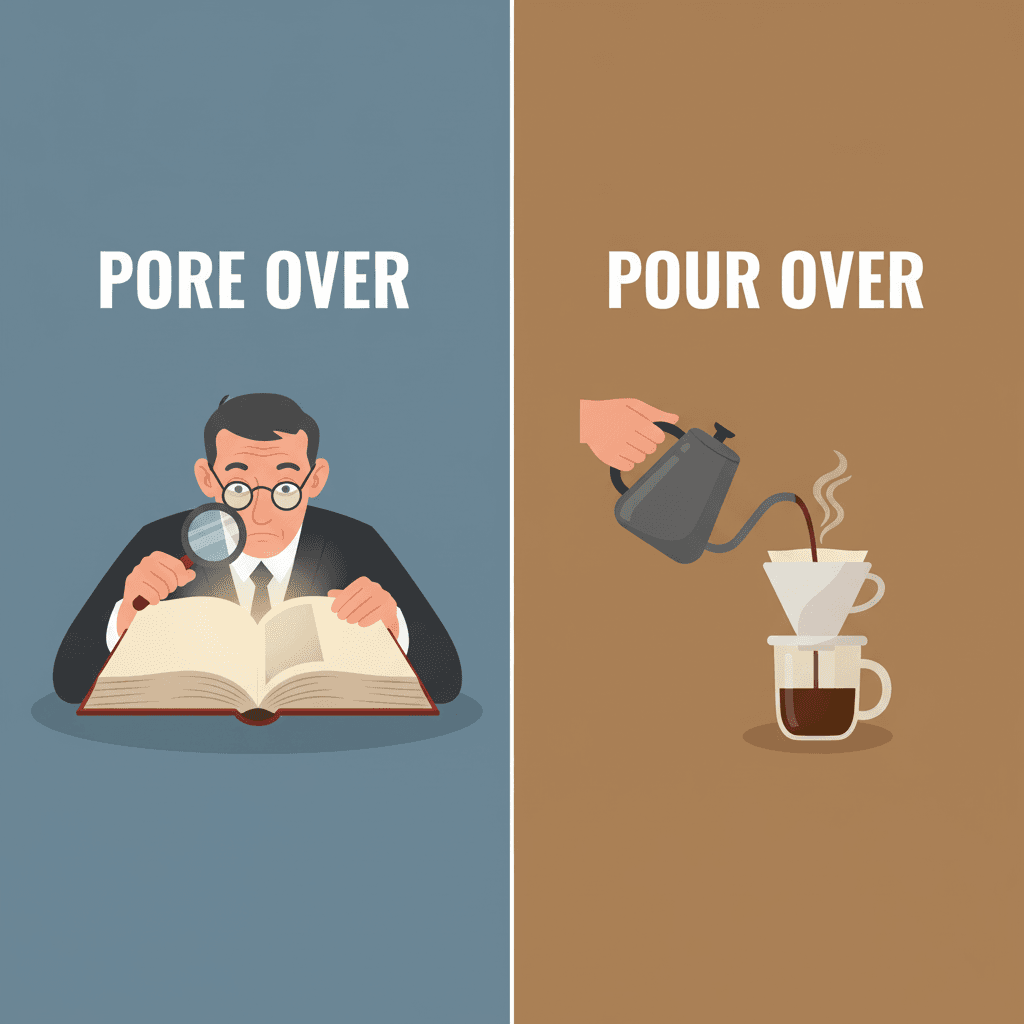Pore Over vs. Pour Over: What’s the Difference?
 These two expressions look very similar, but their meanings are completely different.
These two expressions look very similar, but their meanings are completely different.
Pore over → ✔ Correct phrase meaning “to study carefully” Pour over → ✔ Correct phrase meaning “to pour liquid over something”
Because they sound the same, people often confuse them — but only one works for reading or studying.
1. Pore Over
Meaning
Pore over means to examine, study, or read something very carefully.
The verb pore here means to focus your attention deeply.
Examples (10 total)
- She pored over the documents for hours.
- He pored over the map to find the best route.
- They pored over the data before making a decision.
- The student pored over her textbook all night.
- Researchers pored over thousands of reports.
- He pored over the instructions carefully.
- She pored over old photos from her childhood.
- The lawyer pored over every detail of the case.
- Journalists pored over leaked files.
- They pored over customer feedback to improve the product.
🧠 Tip:
If it means study, the word is pore, not pour.
2. Pour Over
Meaning
Pour over means to pour liquid over something — often used in cooking, coffee-making, or everyday actions.
Examples (10 total)
- He poured water over the plants.
- She poured sauce over the pasta.
- They poured milk over the cereal.
- She poured hot water over the tea leaves.
- The chef poured dressing over the salad.
- He poured coffee over ice for a cold brew.
- She poured glaze over the cake.
- They poured oil over the vegetables.
- He poured paint over the old wood.
- She poured broth over the noodles.
🧠 Tip:
If there is liquid, use pour.
3. Quick Comparison Table
| Phrase | Meaning | Example |
|---|---|---|
| Pore over | study/examine carefully | She pored over the report. |
| Pour over | pour liquid over something | He poured water over the plants. |
4. How to Remember
👉 Pore = eyes → you read or examine
👉 Pour = liquid → you pour something
Memory trick:
If the sentence has books, documents, notes, or data → pore over
If it has water, milk, coffee, sauce → pour over
5. Common Mistakes
❌ Writing “pour over” when talking about reading
✔ Use pore over
❌ Confusing sound-alike verbs
✔ “Pore” means focus; “pour” means liquid
❌ Thinking both are interchangeable
✔ They describe entirely different actions
Writing More Naturally
Using the wrong phrase — like writing “pour over a book” — can make your sentences sound unnatural. If you want your writing to flow smoothly and avoid mix-ups with similar expressions, an AI humanizer can help refine your text so every phrase sounds natural and human.
FAQs
1. Which phrase means “to study carefully”?
Pore over.
2. Which one refers to liquid?
Pour over.
3. Are they interchangeable?
No — they have different meanings.
4. Why do people confuse them?
They sound the same, but the verbs come from different roots.
Practice: Choose the Correct Phrase (“Pore Over” or “Pour Over”)
(Answers are at the end.)
- She __________ the documents for hours.
- He __________ milk over the cereal.
- They __________ the data to find patterns.
- She __________ hot water over the coffee grounds.
- The lawyer __________ the contract carefully.
- He __________ water over the plants every morning.
- Students __________ their textbooks before exams.
- She __________ dressing over the salad.
- Researchers __________ ancient manuscripts.
- He __________ broth over the noodles.
Answers
- pored over
- poured over
- pored over
- poured over
- pored over
- poured over
- pored over
- poured over
- pored over
- poured over
